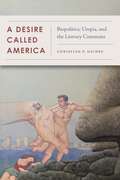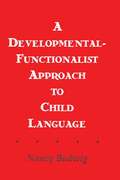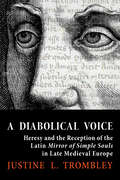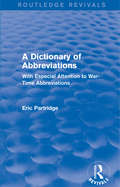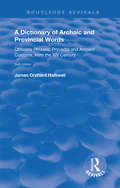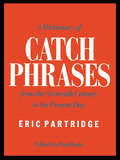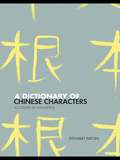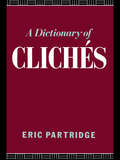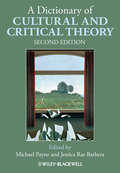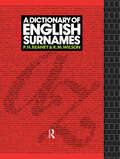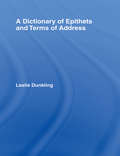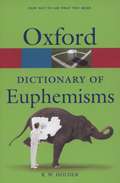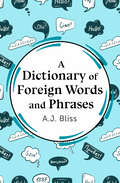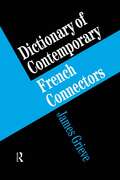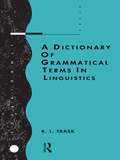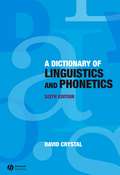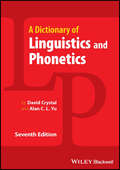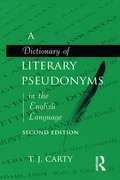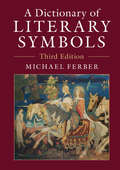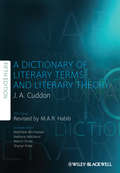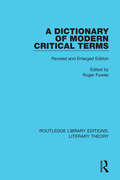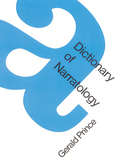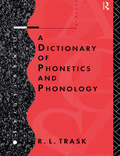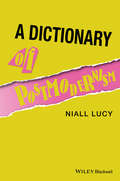- Table View
- List View
A Desire Called America: Biopolitics, Utopia, and the Literary Commons
by Christian HainesCritics of American exceptionalism usually view it as a destructive force eroding the radical energies of social movements and aesthetic practices. In A Desire Called America, Christian P. Haines confronts a troubling paradox: Some of the most provocative political projects in the United States are remarkably invested in American exceptionalism. Riding a strange current of U.S. literature that draws on American exceptionalism only to overturn it in the name of utopian desire, Haines reveals a tradition of viewing the United States as a unique and exemplary political model while rejecting exceptionalism’s commitments to nationalism, capitalism, and individualism. Through Walt Whitman, Emily Dickinson, William S. Burroughs, and Thomas Pynchon, Haines brings to light a radically different version of the American dream—one in which political subjects value an organization of social life that includes democratic self-governance, egalitarian cooperation, and communal property.A Desire Called America brings utopian studies and the critical discourse of biopolitics to bear upon each other, suggesting that utopia might be less another place than our best hope for confronting authoritarianism, neoliberalism, and a resurgent exclusionary nationalism.
A Developmental-functionalist Approach To Child Language
by Nancy BudwigAlthough there has been much empirical study within what has been referred to as "functional approaches to child language," there has yet to be a major attempt to compare and contrast such proposals. In addition, much of the work carried out within child language from a functionalist perspective has not been specific with regard to the nature of the approach adopted. In attempting to fill the gap, the author of this book begins with a comparison of various functionalist approaches. By concentrating on one domain -- agentivity and control -- Budwig develops a set of research questions based on an examination of findings stemming from linguistics, psycholinguistics, and developmental psychology, and also provides an in-depth discussion of related methodological issues. In the second part of the book, she traces the development of linguistic means to refer to oneself within a developmental-functionalist perspective. Individual case studies as well as group analyses of six children in the early phases of acquiring English grammar are provided. In the last part, Budwig examines the relationship between forms and functions in development with special attention to potential generalizations about the organization and reorganization of the children's linguistic systems.
A Diabolical Voice: Heresy and the Reception of the Latin "Mirror of Simple Souls" in Late Medieval Europe (Medieval Societies, Religions, and Cultures)
by Justine L. TrombleyIn A Diabolical Voice, Justine L. Trombley traces the afterlife of the Mirror of Simple Souls, which circulated anonymously for two centuries in four languages, though not without controversy or condemnation. Widely recognized as one of the most unusual and important mystical treatises of the late Middle Ages, the Mirror was condemned in Paris in 1310 as a heretical work, and its author, Marguerite Porete, was burned at the stake. Trombley identifies alongside the work's increasing positive reception a parallel trend of opposition and condemnation centered specifically around its Latin translation. She's discovered fourteenth- and fifteenth-century theologians, canon lawyers, inquisitors, and other churchmen who were entirely ignorant of the Mirror's author and its condemnation and saw in the work dangerous heresies that demanded refutation and condemnation of their own. Using new evidence from the Mirror's largely overlooked Latin manuscript tradition, A Diabolical Voice charts the range of negative reactions to the Mirror, from confiscations and physical destruction to academic refutations and vicious denunciations of its supposedly fiendish doctrines. This parallel story of opposition shows how heresy remained an integral part of the Mirror's history well beyond the events of 1310, revealing how seriously churchmen took Marguerite Porete's ideas on their own terms, in contexts entirely removed from Marguerite's identity and her fate. Emphasizing the complexity of the Mirror of Simple Souls and its reception, Trombley makes clear that this influential book continues to yield new perspectives and understandings.
A Dictionary of Abbreviations: With Especial Attention to War-Time Abbreviations (Routledge Revivals: The Selected Works of Eric Partridge)
by Eric PartridgeFirst published in 1942, this dictionary was designed to help civilians and members of H.M. forces to make their way amid the jungle of wartime abbreviations. The preface notes that newspaper readers, sailors, soldiers and airmen had to thrust themselves, like explorers, into these abbreviations in search of truth, or the execution of their martial duty and hence, a dictionary was necessary. This book will be of interest to scholars of history and language, as well as the more general, interested reader.
A Dictionary of Archaic and Provincial Words: Obsolete Phrases, Proverbs, and Ancient Customs, from the XIV Century (Routledge Revivals)
by James Orchard HalliwellSo far I may be permitted to speak without intrenching on the limits of criticism. A work containing more than 50,000 words, many of which have never appeared even in scattered glossaries, and illustrated, with very few exceptions, by original authorities, much contain valuable material for the philogist, even if disfigured by errors. With respect to the latter contingency, I am not acquainted with any glossary, comprising merely a few hundred words which does not contain blunders, although in many instances the careful attention of the editor has been specially directed to the task. Can I then anticipate that in a field so vast that no single life would sufice for a minute examination of every object, I could have escaped proportionate liabilities? That such may be pointed out I have little doubt, notwithstanding the pains to prevent their occurrence, but it will be manifestly unfair to make them the test of merit, or thence to pronounce a judgement on the accuracy of the whole.
A Dictionary of Catch Phrases: British and American, from the Sixteenth Century to the Present Day
by Eric PartridgeA catch phrase is a well-known, frequently-used phrase or saying that has `caught on' or become popular over along period of time. It is often witty or philosophical and this Dictionary gathers together over 7,000 such phrases.
A Dictionary of Chinese Characters: Accessed by Phonetics
by Stewart PatonBy arranging frequently used characters under the phonetic element they have in common, rather than only under their radical, the Dictionary encourages the student to link characters according to their phonetic. The system of cross-referencing then allows the student to find easily all the characters in the dictionary which have the same phonetic element, thus helping to fix in the memory the link between a character and its sound and meaning. This innovative resource will be an excellent study-aid for students with a basic grasp of Chinese, whether they are studying with a teacher or learning on their own.
A Dictionary of Cliches
by Eric PartridgeThis work is full of things better left unsaid: hackneyed phrases, idioms battered into senselessness, infuriating Gallicisms, once-familiar quotations and tags from the ancient classics. It makes a formidable list, amplified as it is with definitions, sources, and indications of the clichés, venerability in every case.
A Dictionary of Cultural and Critical Theory
by Jessica Rae Barbera Michael PayneNow thoroughly updated and revised, this new edition of the highly acclaimed dictionary provides an authoritative and accessible guide to modern ideas in the broad interdisciplinary fields of cultural and critical theory Updated to feature over 40 new entries including pieces on Alain Badiou, Ecocriticism, Comparative Racialization , Ordinary Language Philosophy and Criticism, and Graphic NarrativeIncludes reflective, broad-ranging articles from leading theorists including Julia Kristeva, Stanley Cavell, and Simon CritchleyFeatures a fully updated bibliographyWide-ranging content makes this an invaluable dictionary for students of a diverse range of disciplines
A Dictionary of English Surnames
by P. H. Reaney R. M. WilsonThis classic dictionary answers questions such as these and explains the origins of over 16,000 names in current English use. It will be a source of fascination to everyone with an interest in names and their history.
A Dictionary of Epithets and Terms of Address
by Leslie DunklingFirst published in 1990. Routledge is an imprint of Taylor & Francis, an informa company.
A Dictionary of Euphemisms
by Bob HolderIn addition to traditional favorites including to bite the dust, working girl, and powder room, includes such new circumlocutions as odorously challenged, downsizing, and white knuckler (flight on a small airplane). The entries explain the history and purpose of the coinage and give an example of its use. One criteria for inclusion is that the phrase once meant something else. A thematic index includes such entries as death, illness, narcotics, obesity, homosexuality, and urination.
A Dictionary of Foreign Words and Phrases
by A J BlissA fascinating A-to-Z reference to foreign words and phrases that have become part of contemporary English usage. The English language has been greatly enriched by a vast array of words and phrases imported from other tongues, such as comrade, chateau, wunderkind, and vox populi. For the average English speaker, many are bound to be familiar. Some may even appear to be standard English, while others may seem, well,foreign. A Dictionary of Foreign Words and Phrases presents a comprehensive list of such terms, with entries that reveal their meanings and etymologies.
A Dictionary of French Connectors
by James GrieveConnecting words and phrases are essential for discussion, clarity and fluency in any language. French is particularly reliant on connecting language: also and in fact have around 15 equivalent words and expressions in French. This is the first French-English dictionary to focus on this fascinating and crucial part of the language. The dictionary presents nearly 200 full entries in alphabetical order, including: de plus; et ce; or; c'est dire que; en fait; au total; voila. Entries define, discuss and exemplify the whole range of connecting language in French. 2000 examples add further clarity and are chosen from a wide range of registers and mainly contemporary prose.
A Dictionary of Grammatical Terms in Linguistics
by R.L. TraskThis dictionary of grammatical terms covers both current and traditional terminology in syntax and morphology. It includes descriptive terms, the major theoretical concepts of the most influential grammatical frameworks, and the chief terms from mathematical and computational linguistics. It contains over 1500 entries, providing definitions and examples, pronunciations, the earliest sources of terms and suggestions for further reading, and recommendations about competing and conflicting usages. The book focuses on non-theory-boumd descriptive terms, which are likely to remain current for some years.Aimed at students and teachers of linguistics, it allows a reader puzzled by a grammatical term to look it up and locate further reading with ease.
A Dictionary of Linguistics and Phonetics (The Language Library #30)
by David CrystalDavid Crystal's A Dictionary of Linguistics and Phonetics has long been the standard single-volume reference for its field. Now available in its sixth edition, it has been revised and updated to reflect the latest terms in the field. Includes in excess of 5,100 terms, grouped into over 3,000 entries Coverage reflects recommendations by a team of experts in phonetics, phonology, syntax, semantics, sociolinguistics and psycholinguistics, making it exceptionally comprehensive Incorporates new ideas stemming from the minimalist program Contains a separate table of abbreviations and table of symbols, along with an updated International Phonetic Alphabet Updates entries to reflect the way established terms are now perceived in light of changes in the field, providing a unique insight into the historical development of linguistics Remains the standard single-volume reference for the field of linguistics and phonetics.
A Dictionary of Linguistics and Phonetics (The\language Library #30)
by David Crystal Alan C. L. YuThe fully updated new edition of the essential single-volume reference, covering the full fields of linguistics and phonetics Now in its seventh edition, A Dictionary of Linguistics and Phonetics remains the definitive resource work for students of linguistics and phonetics. Originally created by David Crystal and revised for the new seventh edition with Alan C. L. Yu, this dictionary features a wealth of new entries by a team of experts in phonetics, phonology, syntax, semantics, sociolinguistics, and psycholinguistics. Throughout the text, most pre-existing entries have been updated to reflect the current body of knowledge in the areas of linguistics and phonetics. Covering more than 5,100 terms, the new seventh edition reflects the latest state of the field and accounts for evolutions in research and theory since the publication of the prior edition. The entries provide clear and authoritative definitions of each term and are supported by additional information such as the historical context in which a term was used or the relationship between a term and others from associated fields. This useful work: Features new and updated entries reflecting the way established terms are now perceived in light of changes in the field Integrates ideas from the minimalist program, situating linguistic theory in the broader cognitive sciences Includes tables of abbreviations, symbols, and the International Phonetic Alphabet Offers unique insights into the historical development of linguistics Identifies major lexical variants as separate headwords, enabling readers to quickly find the location of a term Provides word-class identifiers and usage examples for single-word headwords, especially useful for non-native English speakersA Dictionary of Linguistics and Phonetics, Seventh Edition is an invaluable reference work for professionals, students, and general readers alike, and remains an essential resource for anyone studying linguistics or phonetics at the university level.
A Dictionary of Literary Pseudonyms in the English Language
by T. J. CartyIn its first edition Dictionary of Literary Pseudonyms established itself as a comprehensive dictionary of pseudonyms used by literary writers in English from the 16th century to the present day. This new Second Edition increases coverage by 35%! There are two sequences: Part I - which now includes more than 17,000 entries- is an alphabetical list of pseudonyms followed by the writer's real name. Part II is an alphabetical list of writers cited in Part I-more than 10,000 writers included-providing brief biographical details followed by pseudonyms used by the wrter and titles published under those pseudonyms. Dictionary or Literary Pseudonyms has now become a standard reference work on the subject for teachers, student, and public, high school, and college/universal librarians. The Second Edition will, we believe, consolidate that reputation.
A Dictionary of Literary Symbols
by Michael FerberThis is the first dictionary of symbols to be based on literature, rather than 'universal' psychological archetypes or myths. It explains and illustrates the literary symbols that we all frequently encounter (such as swan, rose, moon, gold), and gives hundreds of cross-references and quotations. The dictionary concentrates on English literature, but its entries range widely from the Bible and classical authors to the twentieth century, taking in American and European literatures. For this new edition, Michael Ferber has included over twenty completely new entries (including bear, holly, sunflower and tower), and has added to many of the existing entries. Enlarged and enriched from the first edition, its informed style and rich references make this book an essential tool not only for literary and classical scholars, but for all students of literature.
A Dictionary of Literary Symbols
by Michael FerberThis is the first dictionary of symbols to be based on literature, rather than 'universal' psychological archetypes or myths. It explains and illustrates the literary symbols that we all frequently encounter (such as swan, rose, moon, gold), and gives hundreds of cross-references and quotations. The dictionary concentrates on English literature, but its entries range widely from the Bible and classical authors to the twentieth century, taking in American and European literatures. For this new edition, Michael Ferber has included over twenty completely new entries (including bear, holly, sunflower and tower), and has added to many of the existing entries. Enlarged and enriched from the first edition, its informed style and rich references make this book an essential tool not only for literary and classical scholars, but for all students of literature.
A Dictionary of Literary Terms and Literary Theory
by J. A. CuddonWith new entries and sensitive edits, this fifth edition places J.A. Cuddon’s indispensable dictionary firmly in the 21st Century. Written in a clear and highly readable style Comprehensive historical coverage extending from ancient times to the present day Broad intellectual and cultural range Expands on the previous edition to incorporate the most recent literary terminology New material is particularly focused in areas such as gender studies and queer theory, post-colonial theory, post-structuralism, post-modernism, narrative theory, and cultural studies. Existing entries have been edited to ensure that topics receive balanced treatment
A Dictionary of Modern Critical Terms: Revised and Enlarged Edition (Routledge Library Editions: Literary Theory #10)
by Roger FowlerThis book, first published in 1987, differs from many other ‘dictionaries of criticism’ in concentrating less on time-honoured rhetorical terms and more on conceptually flexible, powerful terms. Each entry consists of not simply a dictionary definition but an essay exploring the history and full significance of the term, and its possibilities in critical discourse. This title is an ideal basic reference text for literature students of all levels.
A Dictionary of Narratology
by Gerald PrinceHistory, literature, religion, myth, film, psychology, theory, and daily conversation all rely heavily on narrative. Cutting across many disciplines, narratology describes and analyzes the language of narrative with its regularly recurring patterns, deeply established conventions for transmission, and interpretive codes, whether in novels, cartoons, or case studies. Indispensable to writers, critics, and scholars in many fields, A Dictionary of Narratology provides quick and reliable access to terms and concepts that are defined, illustrated, and cross-referenced. All entries are keyed to articles or books in which the terms originated or are exemplified. This revised edition contains additional entries and updates some existing ones.
A Dictionary of Phonetics and Phonology
by R.L. TraskWritten for students of linguistics, applied linguistics and speech therapy, this dictionary covers over 2,000 terms in phonetics and phonology. In addition to providing a comprehensive, yet concise, guide to an enormous number of individual terms, it also includes an explanation of the most important theoretical approaches to phonology. Its usefulness as a reference tool is further enhanced by the inclusion of pronunciations, notational devices and symbols, earliest sources of terms, suggestions for further reading, and advice with regard to usage.The wide range of topics explained include: * Classical phonology, including American Structuralism and the Prague School * Contemporary approaches, including Autosegmental Phonology, Metrical Phonology, Dependency Phonology, Government Phonology and Lexical Phonology * Prosodic ideas in phonology, both traditional and contemporary ^ * * historical phonology * Intonation and tonology This dictionary devotes space to the various theoretical approaches in proportion to their importance, but it concentrates most heavily on non-theory-bound descriptive terminology. It will remain a definitive reference for years to come.
A Dictionary of Postmodernism
by Niall LucyA Dictionary of Postmodernism presents an authoritative A-Z of the critical terms and central figures related to the origins and evolution of postmodernist theory and culture. Explores the names and ideas that have come to define the postmodern condition – from Baudrillard, Jameson, and Lyotard, to the concepts of deconstruction, meta-narrative, and simulation – alongside less canonical topics such as dialogue and punk Includes essays by the late Niall Lucy, a leading expert in postmodernism studies, and by other noted scholars who came together to complete and expand upon his last work Spans a kaleidoscope of postmodernism perspectives, addressing its lovers and haters; its movers and shakers such as Derrida; its origins in modernism and semiotics, and its outlook for the future Features a series of brief essays rather than fixed definitions of the key ideas and arguments Engaging and thought-provoking, this is at once a scholarly guide and enduring reference for the field
